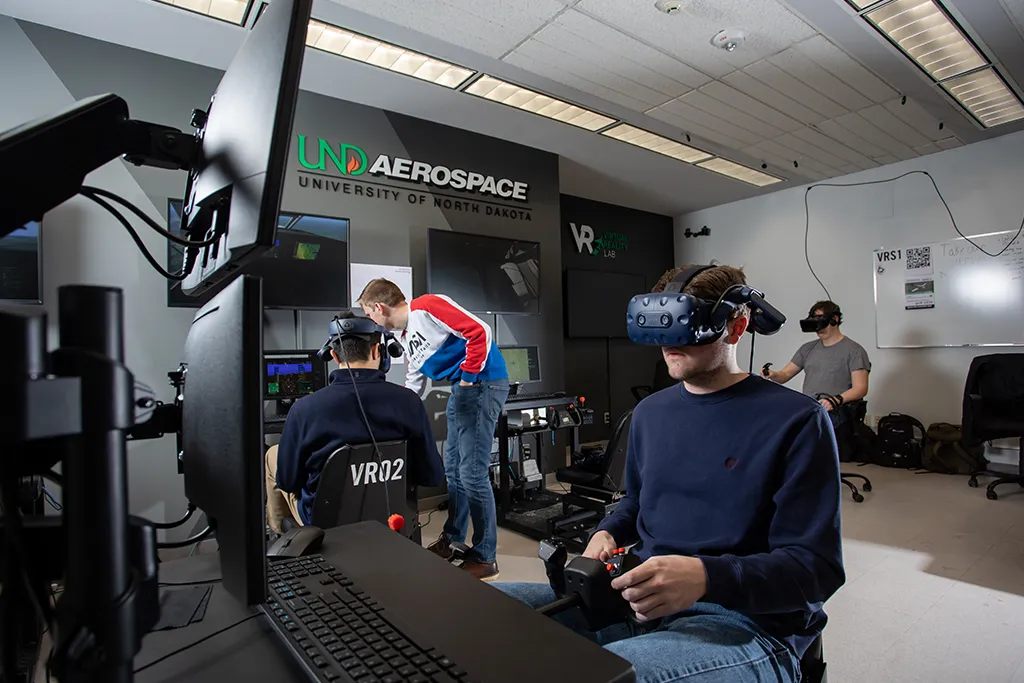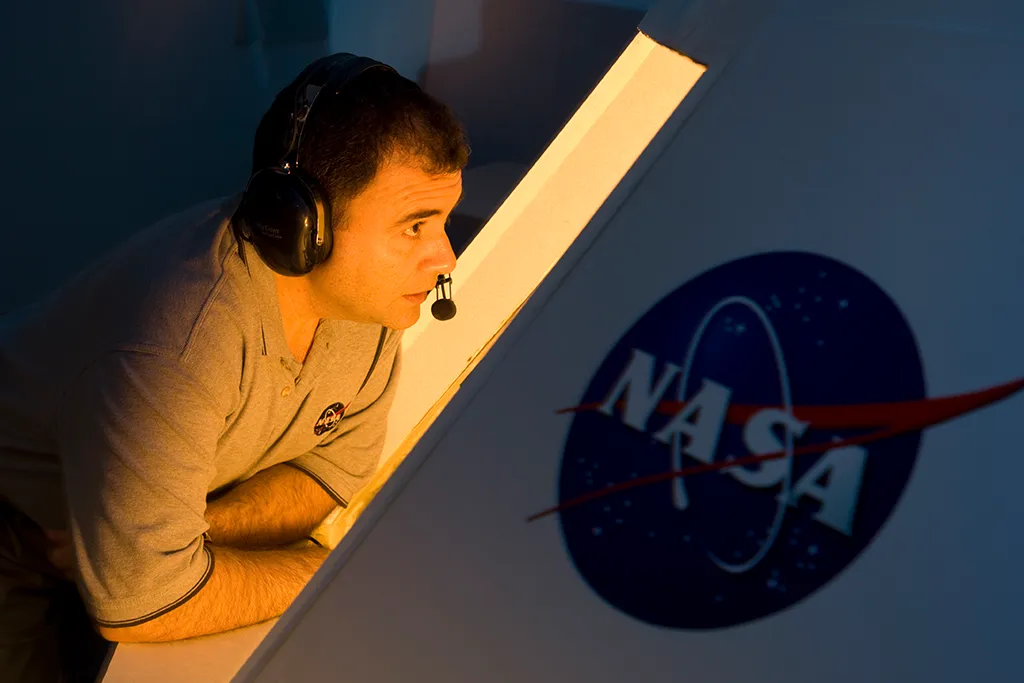
Top Jobs With a Space Studies Degree You Can Pursue
The top jobs in space studies range from space scientist and astrophysicist to aerospace engineer, mission controller, and space policy analyst.
Request Information
Imagine floating through the vast, infinite expanse of space—a universe so immense that our entire planet, let alone us, is just a tiny speck of dust in the grand cosmic scheme. Yet, despite our smallness, we are driven by an insatiable curiosity to explore, understand, and even visit these distant worlds.
This fascination isn't just a passing interest; it's a global commitment. Government investments in space exploration have skyrocketed over the years, increasing from $67 billion during the 2013-2017 period to $81 billion from 2018 to 2022, and now reaching an impressive $93 billion for 2023 to 2027. This growing investment reflects the world's collective passion for space exploration, fueling a surge in opportunities for those interested in space studies degree jobs. So, look to the stars and think about how you want to make your impact in the cosmos.

Jobs You Can Get With a Space Studies Degree
A space studies degree is your ticket to exploring the cosmos—not just through the lens of a telescope but in roles that directly shape our understanding and exploration of space. The possibilities range from hands-on technical work to research, engineering, policy-making, and even education. Here's a closer look at some of these exciting career choices.
Space Scientist
As a space scientist, you work to bring to light the mysteries of the universe. One day, you might be analyzing the composition of distant stars, the next studying the behavior of cosmic particles, or developing new technologies for space missions.
Space scientists work with international space agencies to contribute to groundbreaking research or even be part of missions that push the boundaries of human knowledge. The role is quite diverse as it offers opportunities to specialize in fields like planetary science, astrobiology, or space physics, depending on what aspect of the universe intrigues you most.
Astrophysicist
Astrophysicists focus on the physics of the universe. They explore fascinating phenomena like black holes, neutron stars, and even the Big Bang. Their role is rooted in theoretical work and often involves using complex mathematical models and simulations to understand the forces at play in the cosmos.
Whether working with data from telescopes or conducting simulations on supercomputers, astrophysicists try to answer some of the most fundamental questions about our universe, like the nature of dark matter and energy. It's a career choice that combines curiosity with cutting-edge science, perfect for those who love both abstract thought and the practical application of physics.
Astronomer
Astronomers have their eyes on the sky, quite literally. They observe celestial objects, track their movements, and study phenomena that occur millions of light-years away. Their work often involves using powerful telescopes and sophisticated software to analyze data from space, discover new planets, or understand cosmic events like supernovae.
Astronomers often work at research institutions, universities, or observatories, contributing to our understanding of the universe's vastness and complexity. The role is ideal for those fascinated by the night sky and eager to contribute to discoveries that can change our view of the cosmos.
Planetary Scientist
Planetary scientists study the planets, moons, and other objects within our solar system—and sometimes ones even beyond it. They can analyze data from space missions, such as those sent to Mars or the moons of Jupiter, to understand the surface, atmosphere, and internal composition of these celestial bodies.
Whether it's researching the possibility of water on Mars, the volcanic activity on Io, or the icy crusts of Europa, planetary scientists play a huge role in our exploration of the solar system. It's a field that combines elements of geology, chemistry, and physics, making it a perfect fit for those who are curious about other worlds.
Astrobiologist
Astrobiologists are on a quest to answer one of humanity's oldest questions: Are we alone in the universe? By studying the potential for life in extreme environments on Earth—like deep-sea vents or acidic lakes—astrobiologists gain insights into where and how life might exist elsewhere in the cosmos.
They analyze data from different space missions to search for signs of life or at least conditions that could support it. This field is perfect for those who are fascinated by biology and the possibility of life beyond our planet, combining elements of microbiology, chemistry, and planetary science.
Aerospace Engineer
Aerospace engineers are the genius minds behind all the machines that make it possible for us to go to space. They design, test, and improve spacecraft, satellites, and other vehicles that operate in the harsh environment of space. The job can range from working on the latest space shuttle designs to developing smaller, more efficient satellites for communication and research.
These engineers might also focus on propulsion systems, ensuring that rockets have the power to break free of Earth's gravity, or they could specialize in materials science, creating components that can withstand the extreme conditions of space.
As Sophie Orr, a graduate student at UND, explains, "The objective of my project is to see if some type of pathology might form depending on the type of locomotion in fractional gravity… and then to train astronauts so they don't injure themselves." So, aerospace engineers collaborate closely with researchers to design suits and systems that protect astronauts in space.

Aerospace Program Manager
An aerospace program manager is the coordinator who ensures that space missions stay on track. This role involves overseeing all aspects of a project, from initial planning and design to testing and launch.
Program managers work with teams of engineers, scientists, and other specialists to make sure everything comes together smoothly and on time. They also manage budgets, timelines, and risk assessments, balancing the technical and logistical challenges of space projects.
Satellite Technician
Satellite technicians are the go-to experts for everything related to satellite technology. They install, maintain, and repair satellites, ensuring they function correctly and continue to transmit data back to Earth. At times, this can involve working on the ground at a control station or in the field, where technicians troubleshoot issues and perform routine maintenance.
Satellite technicians also ensure that the satellites we rely on for communication, weather forecasting, and scientific research stay operational and effective.
Space Systems Operator
Space systems operators serve as the link between Earth and space. They monitor and control the operations of satellites, spacecraft, and other space systems, ensuring that everything runs smoothly. This role involves real-time decision-making, as operators must quickly address any issues that arise during a mission.
Space systems operators often work in mission control centers, where they track spacecraft positions, manage communications, and ensure the safety of astronauts. It's a high-pressure, high-stakes job that requires technical knowledge and the ability to stay calm under pressure.
Mission Controller
Mission controllers are the very core of any space mission. They coordinate many aspects of the mission, from launch to re-entry, in order to guarantee that everything goes according to plan. If you choose this role, you'll be working closely with astronauts, engineers, and scientists, managing the flow of information, and even making critical decisions when challenges arise.
These controllers must be highly skilled in communication, problem-solving, and quick thinking, as all their decisions can impact the success of the mission.
Space Data Analyst
Space data analysts sift through enormous amounts of data collected by satellites, telescopes, and space missions in order to find patterns, trends, and insights that can drive research and decision-making. This could involve anything from analyzing the atmospheric data of distant planets to interpreting the signals received from deep space probes.
Space data analysts use advanced software and statistical methods to process the datasets. Their work is also critical to the success of space missions and research projects.
Space Policy Analyst
Space policy analysts are the ones whose decisions can shape the future of space exploration. They work with governments, space agencies, and private companies to develop policies and regulations that govern activities in space. These can include everything from satellite launches to the use of space resources and international treaties.
Space policy analysts need to understand the technical and political aspects of space exploration and its broader geopolitical implications to be in such an impactful position. For those interested in the intersection of science, law, and public policy, this role offers the opportunity to take on responsibilities that blend all three.
Space Law Specialist
Space law specialists deal with the legal side of space exploration. They address issues like satellite regulations, space debris, and international treaties. Through their work, they aim to ensure that space activities comply with both national and international laws.
To successfully manage their duty, these professionals need a strong background in law, with a focus on space-related issues.
STEM Educator
STEM educators are the ones who inspire the next generation of space explorers, scientists, engineers, and practically all the other roles listed above. They teach students about science, technology, engineering, and mathematics, often with a special focus on space studies.
You can find these educators working in schools, museums, and outreach programs, often using hands-on activities and experiments to engage their students and spark their interest in space.

Educational Pathways
Most careers in space exploration begin with a bachelor's degree in a science or space-related field. Standard options include degrees in physics, astronomy, aerospace engineering, or planetary science. Then, for those looking to deepen their expertise and open doors to more specialized roles, pursuing a master's degree is the crucial next step.
UND offers a standout option with its master's in Space Studies program. This interdisciplinary program is designed to provide students with a comprehensive understanding of space exploration, from the scientific principles to the technological innovations that make space missions possible.
One of the unique features of UND's program is the Human Spaceflight Laboratory. Since 2004, this NASA-funded lab has offered students the chance to gain real-world experience in designing and building space suits and habitat prototypes. UND is the first university with a lab dedicated to this kind of work, providing students with unparalleled hands-on learning opportunities that directly translate to the skills needed in the industry.
In addition to the Human Spaceflight Laboratory, UND also boasts the Space Studies Observatory, the only active astronomical observatory in North Dakota. This facility offers students access to multiple internet-controllable telescopes, allowing for diverse observing opportunities. Whether you're interested in studying asteroids, variable stars, or the sun, the observatory provides a platform for groundbreaking research that can complement national observatory programs and enhance your educational experience.
Choosing UND for your master's in Space Studies means gaining access to cutting-edge research facilities and becoming part of a program that is deeply integrated with NASA and other key players in the space industry. The hands-on experience and industry connections you'll build here are invaluable as you prepare for a career in space exploration.
Skills and Qualifications
To succeed in any of these careers, you need much more than just a passion for the stars. You must obtain specialized knowledge as well as develop certain skills, including:
- The ability to interpret complex data and make informed decisions
- Familiarity with advanced technology, whether it's the hardware of a satellite or the software for analyzing astronomical data
- Problem-solving skills since space exploration often involves uncharted territory
- Teamwork, especially when working on space missions
- Ability to clearly convey complex information
While these skills are broadly applicable across many space careers, the qualifications you'll need will depend on your specific role. For example, an aerospace engineer might focus more on technical and engineering skills, while a space policy analyst would need strong communication and analytical abilities.
Is a Space Studies Degree the Right Choice for You?
If you've always been fascinated by space—whether as a child who dreamed of exploring the stars or as an adult who's come to appreciate the complexity and importance of space exploration—this field might be a natural fit. However, beyond just a passion for space, there are practical considerations to keep in mind.
First, evaluate your academic strengths and interests. Space studies is an interdisciplinary field that requires a strong foundation in STEM. If you enjoy subjects like physics, astronomy, and engineering and are comfortable with analytical thinking and problem-solving, you're likely well-suited for the coursework that comes with a space studies degree.
Next, consider the commitment required. Space studies can be demanding, both academically and professionally. Success in this field often requires further education, such as a master's degree or specialized training, particularly if you're aiming for high-level roles in research or engineering.
If you see yourself contributing to space exploration through science, technology, policy, or education, and you're excited about the prospect of being part of a continuously evolving and expanding field, then pursuing a space studies degree could be a wise choice.
Conclusion
In a universe so vast that we've only just begun to scratch the surface, new frontiers await those brave enough to explore them. For space studies graduates, the cosmos offers so many opportunities to choose where their passion lies. And when it comes to preparing for these cosmic adventures, UND is a stellar choice.
From a cutting-edge Space Studies Department and state-of-the-art facilities to a community of dedicated students, staff, and faculty who are deeply invested in advancing our understanding of space, UND is for those who are not just dreamers but doers—those who want to contribute to the next giant leap for mankind.
What is a degree in space studies?
A degree in space studies represents an interdisciplinary program that explores the science, technology, and policy aspects of space exploration. Such a degree prepares students for careers in the aerospace industry, research, or various space-related governmental roles.